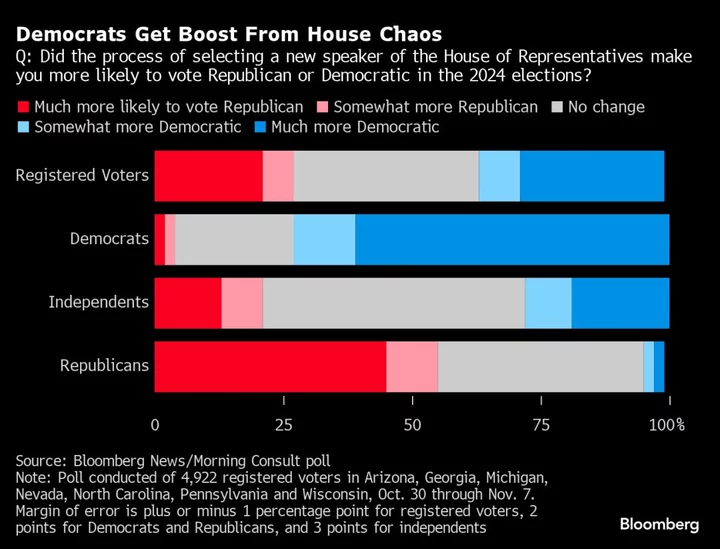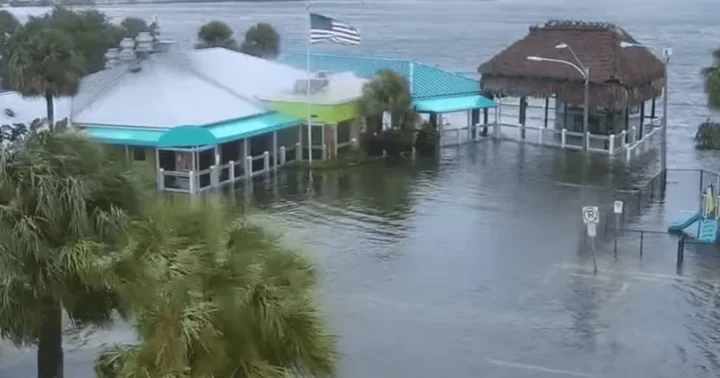The US still faces a risk of a government shutdown at the end of this week despite a new compromise plan by Speaker Mike Johnson that leaves out hardline conservative priorities like cutting spending and curtailing migration.
A shutdown would threaten a downward US credit rating adjustment by Moody’s Investors Service, which has cited political dysfunction as a growing risk to bond investors. A federal funding lapse would also have political repercussions for both parties.
Congress has just days to pass a new stopgap bill before funding runs out after Nov. 17. Johnson on Sunday suggested his plan would buy lawmakers time to negotiate individual spending bills, which fiscal conservatives have demanded.
“Washington’s spending addiction cannot be broken overnight,” he said on the social media site X. “But I will not allow end of year megabus spending packages to continue under my leadership.”
Johnson’s plan could still run aground in the face of combined resistance from GOP conservatives and the White House, which is irked by the lack of Ukraine aid in the plan and the fact it extends funding for some agencies to Jan. 19 and others to Feb. 2.
The House plans to vote on the plan on Tuesday. Johnson will need some Democratic votes given his narrow majority and opposition by fiscal conservatives.
Read more: Swing-State Voters Put Border Before Mideast, Ukraine Conflicts
Even before that stopgap vote, conservatives could block the plan before it comes to the floor or on a procedural vote setting up debate.
“Disappointing is as polite as I can muster. I will be voting NO,” conservative Warren Davidson of Ohio said on X Saturday.
Democrats have been muted in their reaction to Johnson’s plan but there were some early signs it could receive bipartisan backing.
“I don’t like what the House is talking about but I’m willing to listen,” Connecticut Senator Chris Murphy said on NBC’s Meet the Press.
The White House, however, said Johnson’s plan would only lead to future shutdowns. President Joe Biden could issue a formal veto threat later Monday.
But the bill lacks the strings that many Democrats had feared, and a veto threat could allow Republicans to blame the shutdown on the president.
Political Dysfunction
This year has brought the US near a debt default, provoked Fitch Ratings to downgrade the nation’s sovereign debt and cost Johnson’s predecessor his job. Republican hardliners ousted then-Speaker Kevin McCarthy after he offered a similar strings-free stopgap.
Moody’s, the only major credit grader still to give the US its top rating, on Friday changed its ratings outlook for the US from stable to negative, citing risks to the nation’s fiscal strength and political polarization in Congress.
The chaotic three-week process to elect a new speaker damaged Republicans’ standing in swing states, according to a Bloomberg News/Morning Consult poll from Oct. 30 through Nov. 7.
By a 9 percentage-point margin, swing-state voters said the speaker chaos made them more likely to vote Democratic in 2024 over those who said the process made it more likely they would vote Republican. Among independents, the margin was 7 points in favor of Democrats.
A shutdown beginning Saturday would furlough hundreds of thousands of federal workers just before the Thanksgiving holiday and delay government contracts and vendor payments. Military personnel, law enforcement officers and other essential employees would continue to work but go without pay until the impasse is resolved.
Financial markets so far have shrugged off the growing risk of a shutdown as investors focus on high interest rates, volatility in bond markets, slowing consumer spending and war in the Middle East.
A government shutdown would initially have a mild economic impact but build incrementally as millions of workers go without salary, private contractors aren’t paid and consumer uncertainty grows. The University of Michigan Consumer Sentiment index slid to a six-month low in its preliminary November reading.
Read more: The Fed, The Economy and the Shutdown: What You Need to Know
Johnson’s plan would extend current funding until Jan. 19 for the departments of Veterans Affairs, Energy, Agriculture, Transportation as well as Housing and Urban Development, with the rest extended to Feb. 2.
In the Senate, Republicans could move as soon as Monday night to block Democrats from starting work on their rival plan.
Senate Majority Leader Chuck Schumer of New York has teed up a procedural vote Monday afternoon to advance placeholder legislation for temporary funding, likely into January.
Senators in both parties have also been discussing a path forward for $106 billion in security funding Biden sought for Ukraine, Israel, Taiwan and the US border. The package has been held up by Republican demands for asylum and other immigration policy changes.
Chances for reaching a deal this week that also includes the emergency security assistance are dropping given the complexity of the immigration issue.
--With assistance from Gregory Korte.









